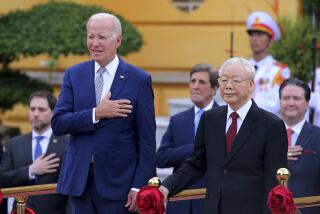U.S., Vietnam Leave âUnhappy Historyâ Behind
HANOI â Twenty-two years after the last U.S. troops left Saigon, the United States and Vietnam are about to take the final steps to normalize relations and officially begin a new era of diplomatic and economic cooperation.
In the next few months, the two countries are to exchange ambassadors. Besides the embassies already operating in Washington and Hanoi, they will open consulates--the Americans in Ho Chi Minh City (formerly Saigon) and the Vietnamese in San Francisco.
The exchange begins a new relationship that Hanoi has long sought.
âWeâve been determined to encourage the process of normal relations with the United States,â Deputy Foreign Minister Vu Khoan said, âand generally speaking, weâve made a lot of progress--in trade, investment, the MIA issue and other areas of cooperation.
âItâs no secret that we have some unlucky, unhappy history between us, but we are doing everything we can to overcome this history and look to the future.â
Assuming he receives Senate confirmation, Pete Peterson, 61, the envoy-designate here, will be the first U.S. ambassador in Vietnam since Graham Martin fled Saigon on April 30, 1975.
Peterson, a Democrat who is leaving Congress after representing the state of Florida, will be the first U.S. ambassador ever in Hanoi. The U.S. consulate in Hanoi was closed in 1954 after Franceâs defeat at Dien Bien Phu.
Peterson, a former Air Force captain, will be returning to the country where he was held as a prisoner of war for almost seven years, much of it spent in the old French penitentiary that Americans called the âHanoi Hilton.â
The prison, which once sprawled over a full city block, has been demolished to make way for the 20-story Hanoi Tower. The new development is nearing completion and will house offices, retail space and luxury apartments--with the likely cost of a three-bedroom unit running about $6,000 a month.
The structure towers over the surrounding two-story buildings on the congested street and provides a symbol of Hanoiâs pell-mell rush from a period of isolation into one of economic development spurred by foreign investment.
Peterson, in a recent interview in his Washington office, denied that his return to Hanoi represented any kind of personal closure.
âIâm focusing on the possibilities for the future, not reliving the past,â he said.
He listed his priorities as resolving the issue of MIAs and POWs; improving business ties; and fostering an understanding between the two countries.
Vietnamâs initial reluctance to help resolve the MIA/POW issue long represented a major obstacle to the normalization of relations.
But Americans familiar with the issue said Vietnam now offers âexcellent cooperationâ and is more forthcoming than either Laos or Cambodia. U.S. personnel in Hanoi can be in a helicopter within 20 minutes to check out a report of a sighting of remains.
From the Vietnamese perspective, the normalization process has been frustratingly slow. Many officials in Hanoi had hoped the lifting of the trade embargo in February 1994 would lead to quicker economic gain.
Diplomatic relations between the United States and Vietnam were reestablished in July 1995, and the first U.S. Embassy in Hanoi was opened the next month in a nine-story office building.
Though Western business people have been frustrated in learning how to deal with Vietnamâs bureaucracy, Vietnam and its 75 million people are clearly viewed by investors as an Asian market of growing long-term importance.
Since the embargo was lifted, U.S. investment in Vietnam has grown to $1.3 billion. U.S. financial interests here range from the construction of Ford, Coca-Cola and Pepsi plants to 1,100-mile bicycle trips from Hanoi to Ho Chi Minh City offered by U.S. tour operators.
Vietnam Airlines has purchased Boeing jets; Samsonite luggage and Marlboro cigarettes are sold in shops on Pho Trang Thi Street; homes and hotels with satellite dishes receive Cable News Network.
But perhaps the most telling sign of the changing relationship between the U.S. and Vietnam is the widespread use of English and the prominence of U.S. dollars as the favored currency.
More to Read
Sign up for Essential California
The most important California stories and recommendations in your inbox every morning.
You may occasionally receive promotional content from the Los Angeles Times.










